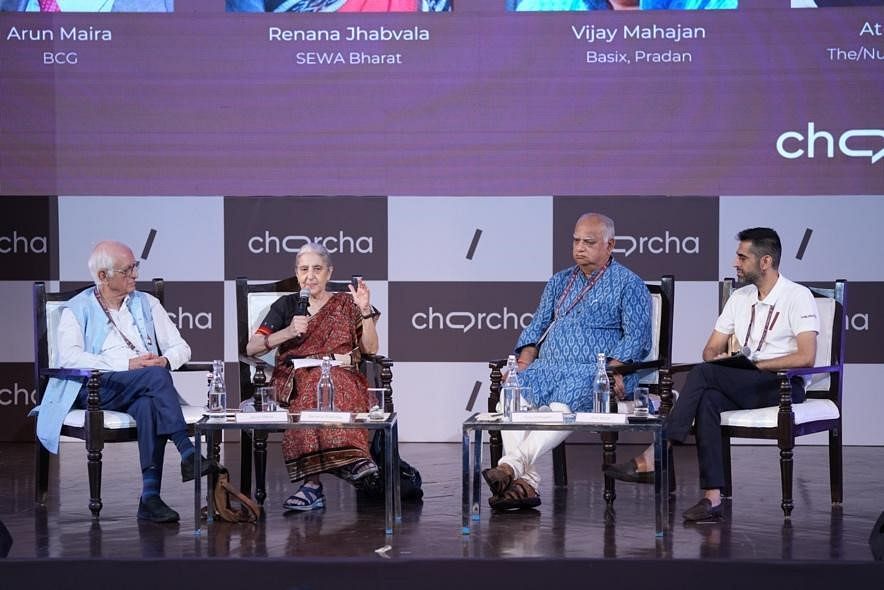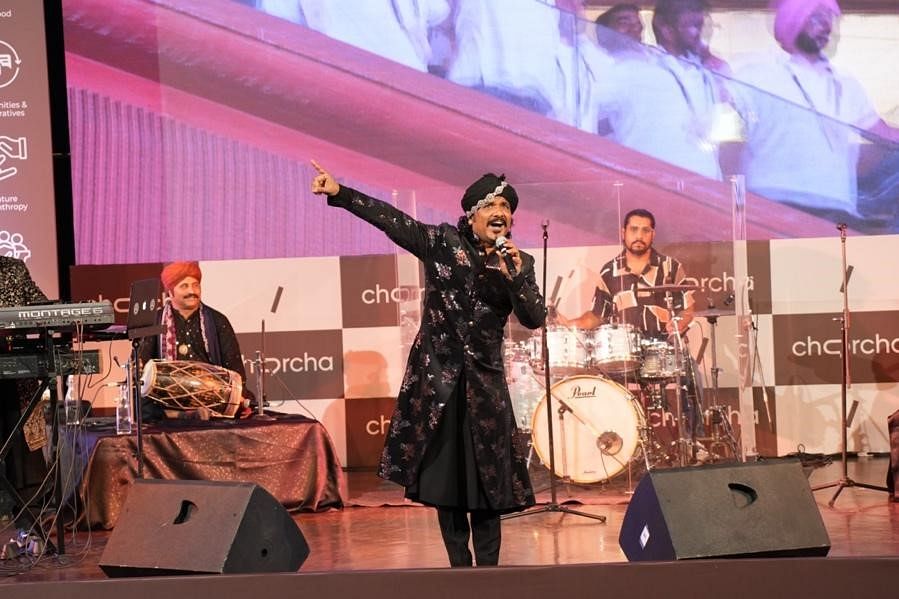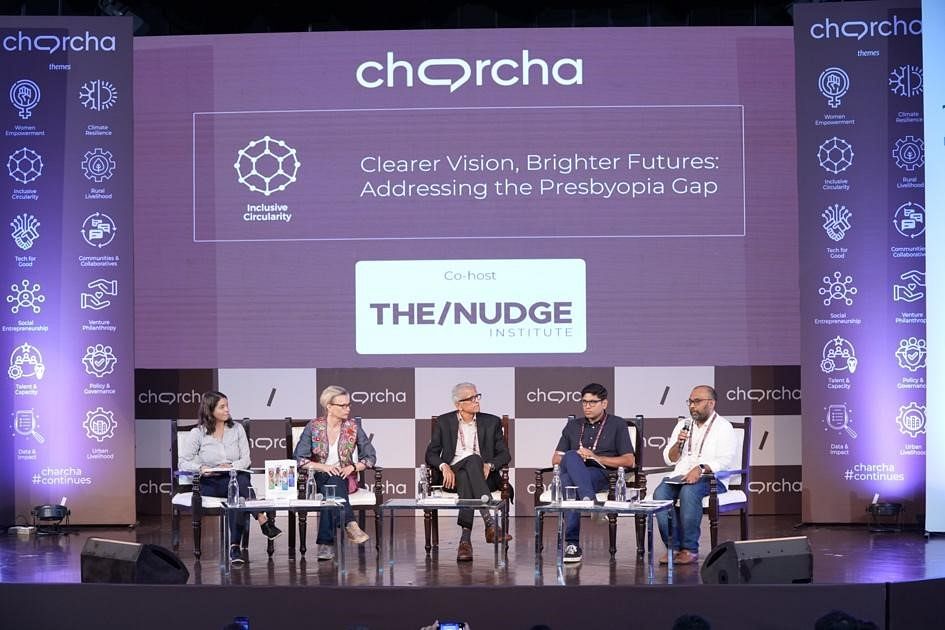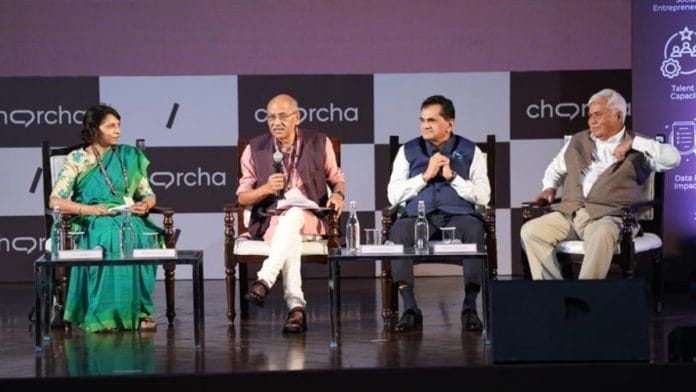It was the best of times, it was the worst of times—Charles Dickens’ words still ring true today.
We live in an age where society is threatened by several critical challenges – from poverty and unemployment to gender inequity and poor health. However, we find ourselves at the cusp of change as the nation makes strides toward realising societal goals, marked by a sharp rise in collaboration, targeted initiatives, and the adoption of innovative tools, such as in healthcare, to help people overcome accessibility gaps and ensure that solutions benefit the community at large, including those traditionally underserved.
Sparking ideas, insights, and innovation is key to advancing collectively – and convenings, like charcha, are where some of this magic happens, building an ecosystem and bringing together visionaries, first-movers, policymakers, industry leaders, agents of change, and grassroots leaders in one space, which can function as a hub of developmental dialogue and action, and a rich ground for ideas and collaborations to take root. The power of such collective forums lies not only in giving key stakeholders and those guiding on-ground efforts a seat at the table but also in ensuring their voices are heard.
At charcha 2024, more than 200 speakers and 2,000 attendees gathered over the three-day event, energised by the potential to discuss pressing age-old and evolving problems, learn from each other, and build meaningful, lasting connections. Some questions were answered, and many more were asked.
Leaders across samaaj, sarkaar, and bazaar explored strategies and solutions considering on-ground realities and our time’s complex problems across several essential themes – including rural livelihoods, women empowerment, inclusion & circularity, policy and governance, social entrepreneurship, capital and philanthropy, and beyond. These were woven together by a common, unifying thread – a vision of Viksit Bharat.
To be ‘Viksit’ in India means several things – envisioning a future where progress is not just an aspiration but a shared commitment, made by 140 crore Indians, to not just transform our nation into a global leader but also to create a nation where every citizen, whether from a small village or a large city, can thrive and grow, as the Prime Minister highlighted in his Independence Day speech.
Conversations around what it means to build a truly inclusive India came alive at charcha this year, kickstarted by an enriching opening plenary featuring G20 Sherpa Shri Amitabh Kant (IAS), who emphasised the work we must do over the coming two decades to transform learning, nutrition, and health outcomes, particularly in India’s most populous states, to transform India into a $30 trillion economy, which is necessary if the nation intends to realise its goal of ‘Viksit Bharat@2047.’ He outlined the central challenge – not in funding, but in the capacity of governance to shift the focus from physical infrastructure to enabling social outcomes.
Ms Arti Ahuja (IAS), Former Secretary, Ministry of Labour and Employment, also stressed the critical need for inclusivity to foster growth. Outlining the requirement of agility in employment and accessible job markets, Ms Ahuja painted a strong mission statement: ensuring that 50 per cent of India is not left behind by development. Leaders from various sectors agreed that achieving ‘Viksit Bharat’ requires a holistic approach centred on sustainable livelihoods.
Several other distinguished speakers from diverse backgrounds led meaningful conversations – from Renana Jhabvala (President, SEWA Bharat) highlighting the need for local solutions, with a focus on India’s villages (aligned with the vision of ‘Viksit Gaon, Viksit Desh’ to build a prosperous nation on the foundation of thriving villages), to Gayatri Divecha (Head Sustainability CSR, Godrej Group) discussing inclusive value chains and waste as a problem cutting across gender, caste, and beyond.

Varun Khaitan (Co-founder, Urban Company), Meg Garlinghouse (Global VP, Social Impact, LinkedIn), Ashwini Saxena (CEO, JSW Foundation), Deepali Khanna (VP – Asia Regional Office, The Rockefeller Foundation), Vijay Mahajan (CEO, Rajiv Gandhi Foundation), Manish Sabharwal (Vice Chairman, Teamlease), Sairee Chahal (Founder, Sheroes & Mahila Money), and Amish Tripathi (author), among others, also brought a wealth of knowledge and experience to the discussions.
Panels spanned a variety of topics, including building community resilience in the face of climate change, betting big on collaboration for philanthropic action, scaling regenerative agriculture, and the economic empowerment of women. Another panel explored India’s rich heritage of art and traditional crafts, following the transformation of this legacy into a modern-day artisanal renaissance. This was paired with other panels making a strong case for green entrepreneurship, underscoring the nation’s commitment to making progress on the UN Sustainable Development Goals.
These dialogues are not just theoretical – they have the potential to form key building blocks of a resilient, inclusive, and prosperous India, reflecting the spirit of collaboration and innovation that will drive the nation forward. Giving people attending the power-packed sessions a creative interlude, the event also celebrated vibrant, dynamic cultural performances by Malini Awasthi and Kutle Khan, live in concert.

At this converging point of ideas around societal transformation and resilient livelihoods, the potential of digital solutions to spur social progress gained prominence, too, particularly as India currently stands on the brink of an AI-driven future. Conversations ranged from the opportunities and challenges surrounding the role of AI to transform skilling, societies, and governance to the need to bridge the gender-digital gap by bringing women to the fore.
As Shri Jayant Chaudhary, Honourable MoS (IC) – Ministry of Skill Development and Entrepreneurship, Government of India, highlighted, policy and government are not currently able to keep pace with the rapid advancements in AI. However, this can change by building competencies and skillsets for jobs in these spaces. charcha 2024 also put on display an electrifying event that tested the boundaries of technology to sustainably solve critical social challenges with an eye on long-lasting impact – the 30-hour Hack4Change hackathon, co-hosted by Google and powered by Hack2Skill.
During the livelihood convening, The/Nudge Institute also unveiled path-breaking research and insights with the launch of its Future of Women in Work – A Distillation Report and ‘Reading Glasses and Livelihood – Challenges and Pathways to Scale Access in India’ report. The first report emphasises how India’s demographic dividend cannot be realised without women’s participation in the workforce. One core priority to make this happen is to include 255 million women in the labour force by 2047.
The second report, developed with guidance from Dr Indu Bhushan (Founding CEO, Ayushman Bharat) examines the issue of presbyopia, or age-related farsightedness, which can impact a person’s quality of life and productivity if uncorrected – and the challenges and opportunities within the eyeglasses market to meet this need. As part of a panel on clearer vision and brighter futures, Peyush Bansal (Co-founder & CEO, Lenskart) shed light on a central problem – of people, especially in rural areas, unwilling to go for eye checkups. He also offered an optimistic look at the future, suggesting that existing distribution channels can be leveraged to make glasses accessible and affordable.

Broadly, charcha 2024, in collaboration with its esteemed partners – LinkedIn, Google, Meta, ATE Chandra Foundation, Bill & Melinda Gates Foundation, Generation India, The Bridgespan Group, British Asian Trust, HSBC India, H&M Foundation, India Leaders for Social Sector, Lend-a-Hand India, NuSocia, Mphasis, Purpose, Samagra, State Street, Tata Steel Foundation, Teamwork Arts, TechnoServe and Tiny Miracles – aimed to convert conversations on progress into concrete actions, and enable like-minded stakeholders to connect and collaborate, driving large-scale transformation and supporting holistic progress.
‘Viksit’ is not just a goal; it’s a movement toward a future where every step forward is taken together, leaving no one behind. This is the spirit of charcha 2024 — the belief that our greatest progress will come from our ability to collaborate and build a resilient India for all.
Vaibhav Budhraja is Director of Marketing at The/Nudge Institute.
Charcha is an initiative towards closing the distance between samaaj, sarkaar and bazaar, (society, government and markets) and was held at India Habitat Centre, New Delhi from August 20-22, 2024.
To know more, visit: charcha 2024
ThePrint is a media partner for charcha, organised by The/Nudge Institute.






